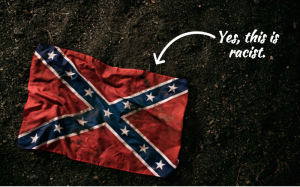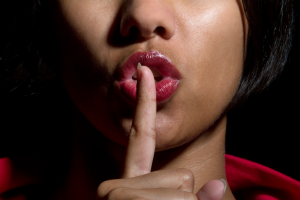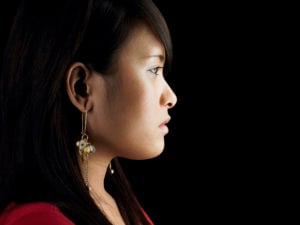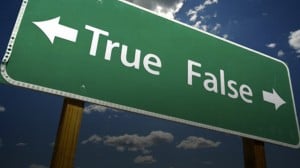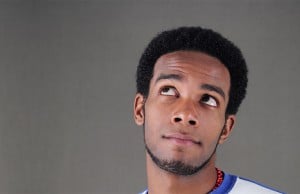
Three clenched fists against a blue background.
At about 10:30pm the night of the election, I gave up. The writing was on the wall: Hillary Clinton wasn’t going to win.
It wasn’t like I was a big Hillary fan. Her support of Bill Clinton’s crime bill and welfare reform were not good for me: a black, immigrant, two-spirited woman who grew up in a single-parent household with four siblings (including two black brothers who, without provocation, may have been deemed “super predators” by Hillary) in the inner city of Newark, Jersey.
No, I wasn’t “with her.”
I was Team Bernie. Free college tuition, healthcare for all, affordable housing, and a rebuke of business as usual appealed to me, personally. Bearing the weight of student loan debt, the hefty cost of five cancer treatments over ten years, and living in Washington, DC, a gentrified city with few affordable neighborhoods, Bernie Sanders spoke revolution to me.
But Bernie didn’t get the anointing of the Democrat party. So, reluctantly, I was with her. Though I wasn’t thrilled to vote for Hillary, I definitely couldn’t vote for Donald Trump. I could list a million reasons why, but the Ku Klux Klan endorsement is enough.
Before 10:30pm, I’d hope that there were more people like me, folks who were willing to go with incremental shifts and small social wins the Democratic party provided. By 10:31pm, my hopes were dashed.
Trump was going to be president-elect. Reality hit me. I felt the hate of white America.
I felt its venom, its disdain for my very existence. Despite my beginnings as a poor black immigrant girl, I am among the elite: educated, cosmopolitan, kale-eating, tree-hugging, non-Christian, uber-liberal woman who believes in the righteousness of minding my own business as people live their lives.
Feelings of hatred that I once understood abstractly were suddenly real. Going to bed that night, I knew the US had not truly changed. It would be the same the day after the election as it was the day before.
Like many who voted for Hillary, I wanted to believe in the surface progress that made America exceptional. It doesn’t. If anything has changed, it is that once impolite white nationalist discourse is now mainstream and normalized.
Trump is not the first white supremacist in the White House.
His ascendency to the presidency forced us out of our long-held delusions. We could no longer pretend we were all in this together (as 53% of white educated women voted for Trump), hide behind our ignorance, or nurture false hopes of white decency.
If we frame Trump’s win in the framework of the Buddha’s teaching, one can argue, we all came to a particular end of our suffering. The Buddha teaches liberation through the end of suffering. Typically, our suffering is linked to attachments – people, places, and things.
We suffer because we hold onto things that are always changing. To transcend our suffering, we must sever our attachments.
In the US, we’re attached to ideas that we are the greatest nation on earth and that our values promote inclusivity, acceptance, and equity. These attachments enable far too many of us to make ahistorical arguments in the face of white grief and white anxiety.
The election enabled us to come face-to-face with realities of this nation – alongside our supposed values of tolerance, compassion, tolerance, and decency are long-held beliefs of intolerance, discrimination, and cruelty.
We are not an exceptional, beautiful people. Rather, we are a country populated with indecent people whose thinly veiled civility has long stood in the way of progress.
Put in proper perspective, there is nothing innately wrong with our ugliness. It was our inability to acknowledge (truth and reconciliation hearings and reparations could be a start) and eradicate our vileness that has caused our suffering and led us to this moment in history.
We are freed from the myth of American values and morals. Now, thanks to Trump and his supporters, we can begin the path to true liberation – a liberation that will create real peace rather than a veneer of politeness.
When the election season began, the thought that I’d be grateful for Trump’s presence or his supporters never crossed my mind. After all, Trump – under the promise of restored economic domination – emancipated whiteness to speak its rage.
His emancipation of whiteness, however, is not limited to the white Americans who buy into it. Emancipation is far-reaching, liberating all those who walk in its sphere. In that sense, Trump freed us all. Here are five ways how.
1. We’re Freed From Collective and Individual Suffering
We suffer because we are unable to accept and see things as they really are. Trump’s ascendency to the presidency enabled us to see things as they really are. We can all collectively agree that it’s a myth that America is a post-racial society.
The election illustrated that color is central to the definition of America.
We do not live in a post-racial society. White liberals will especially benefit from this liberation, as more than any other group, they believed the myth.
Rather than wallow in disappointment, white liberals can use this liberatory moment to explore their connection to white conservatives – many of who are abandoned family members deemed backwards – and do some serious ally work: Educate their own.
Liberal white Americans can also begin to confront their own racism. They can begin to explore their white guilt, white shame, and white fragility, all of which are behaviors that perpetuate marginalization of those with whom they claim to be allied.
The self-exploratory journey is necessary for true transformation. It will bring greater self and collective awareness to structural barriers that hold white supremacy in place. It is the pathway to collective resistance and peace.
2. We’re Liberated From the ‘Politics of Respectability’
The “politics of respectability” centers the white gaze and is an extension of internalized racism. It’s based on what “whiteness” thinks is acceptable, normative, and right.
We, people of color, are free to stop manipulating our manners, speech, dress, and tastes to make whiteness comfortable.
The election results showed us is that mainstream “whiteness” is fiction. Mainstream whiteness does not value good manners, Standard American English, or designer clothing. In fact, they consider these attributes elitist.
Real whiteness, which has been clearly defined by this election, is exclusionary and hateful. Why must we assuage the anxieties of whiteness when it’s designed to keep us inferior?
Besides, the “politics of respectability” is personally demoralizing and divisive. For centuries, black Americans, for example, waged an intraracial war against one another. Middle-class black Americans were pit against poor and working-class black Americans against black immigrants.
The black middle class, who is often defined as educated, married elites, shamed black working-class Americans for everything from their single-parent households to their sagging jeans.
Shaming each other our family structures and clothes robs black people of the full expression of their humanity and creativity.
The renunciation of the white gaze frees black people (and other minorities), in the words of Langston Hughes, to “express their individual dark-skinned selves without fear or shame.”
3. We’re Emboldened to Challenge Our More Limiting Beliefs About Ourselves
By now, we’ve all seen the memes: “Trump is a reminder that you should apply for that job you want even if you don’t have experience.”
What’s amazing about Trump presidential run is that he did it. Trump is not a politician and has no military experience. He rose to political prominence by claiming the sitting president wasn’t American.
Trump is a well-known entertainment and business brand. He comes to the job of the presidency with a record of multiple failed businesses and bankruptcies.
On the surface, many would just say that Trump’s audacity to run for president is a symptom of his white privilege and socialization as man. I do not deny that. It’s true.
However, on a deeper level, there is something else operating underneath Trump white machismo – his unwavering self-confidence and a deep conviction in his ability to manifest what he wants in his life.
At no point in the campaign did Trump accept the idea that he didn’t belong on the stage with seasoned Republicans. Not once did he falter in his singular belief he would be able to fulfill on his promise of jobs. Trump once claimed that it was his unwavering positive thinking that enabled him to pull himself out of his business failings.
His businesses failed, but he did not.
An astute student of Norman Vincent Peale, author of The Power of Positive Thinking, Trump did not allow his circumstances to stop or define him. Trump exudes an unwavering self-confidence and positivity that is enviable.
Take a lesson out of Trump’s book: Free yourself from your negative thinking, focus on what you want to see in your life, and defy your circumstances to make it happen.
This is not whimsical thinking that asks you to deny structural barriers or real threats to our lives by everyday bigots and policymakers. Rather, this is thinking that asks you to look for the opportunity in these challenging circumstances.
As activists, educators, and change-makers in the movement to dismantle the system, it is necessary that we not be despondent and mired down by our circumstances.
We’re living in circumstances that suggest we should not reach for our dreams. But it’s precisely in this moment that we must be bolder, more daring, and more courageous.
4. We No Longer Have to Be Afraid of the Dark
Trump’s unveiled the darkness of this country. The vengeance, anger, rage, despair, and hatred toward anything that threatens to displace whiteness are out in the open.
In our culture, we’re socialized to fear the dark. We should focus on happiness, joy, love, and peace. Haven’t we all heard “Be the light in the darkness?” Our almost singular focus on cultivating “light” negates that darkness and light are part of the totality of our human experiences.
Darkness is the catalyst for growth. Through the darkness, we develop new strengths and fresh ways of seeing the world. White America’s darkness is in the light. And, although disturbing, this is good for all of us.
For many of us, it hard to be with white America’s darkness. Doing so almost always means that our experiences are sidelined.
We’re often asked to do the hard work of proving the fullness of our humanity, which in itself is degrading and psychologically damaging. In doing so, we often are unable to explore the complexity of our humanity.
In this context, however, an opening has been made. We unload our own darkness. If we on the margins are honest, we also harbor resentment, deep frustrations, and dare I say, hatred in our hearts, too.
Our hate is less of people, however, but more of what we constantly have to endure: brutality at the hands of police, threats of deportation, exhaustion of not being given the benefit of the doubt, suspicion of her abilities and credentials, and just the basic right to breathe.
The onslaught is endless. We hurt, too. Our trauma is in our blood. However, we do not have the cloak of whiteness to dull our pain.
Many of us are left adrift in internalized denial and shame about our feelings. Often, we’re left to endure our darkness in the dark. How many of us can readily admit we hate white people who are invested in whiteness?
Part of the recent calls for us to focus on self-care during these trying times must include calls for us to tend to our darkness. It is personal and political to attend to our darkest emotions.
I believe that embracing our darkest emotions is an intricate part of dismantling white supremacy. Refusing to make our darkness palatable to whiteness undoes the system. Putting on full display the complexity of our humanity, without regard to swaying white people’s opinion of us, is an assertion of our freedom.
Moreover, I firmly believe that the more we are able to be with what we dislike within ourselves, the more we can love ourselves, and in turn love others. Embracing our darkest emotions is a radical, revolutionary act of self-love.
As we unload our specific personal demons, we create a space to create the just and inclusive society that is necessary for all us to thrive.
5. We Can Truly Establish a New System and Define Our Freedom
Trump ran and won as the anti-establishment candidate. Even the establishment bought into his claims. The Republican and Democratic establishments dismissed him.
Upon close examination, however, it is evident that Trump is the establishment. The pledge to “make America great again” is a well-known code that signifies: Make America white again. It is call to return whiteness as the central defining feature of national identity.
But, interestingly, although white Americans feel they are losing their grip on white superiority, whiteness has never been decentralized.
Even our collective quest to resist whiteness, we place whiteness at the center of our resistance. We define ourselves by how we are not “whiteness” (non-conforming and rebuking “traditional” values) or how we are just like “whiteness” (respectable and normal).
Underlining many of our narratives of resistance are themes of the white establishment “valuing us,” “respecting us,” and “caring for us.”
How do we free ourselves from this dialectical relationship? I don’t know. However, I do know that this moment calls for us to center us rather than whiteness.
What if we defined freedom for ourselves? In our resistance to trump hate, we cannot just focus on the world we do not want to live in; we must also focus on the world we want to live in.
***
I understand that many of us are afraid. We are faced with real threats to our physical, mental, emotional, psychological, and financial well being.
My goal is not to dismiss those threats, cast Trump as some pseudo-savior or take us through some airy-fairy, magical thinking exercise.
My goal is to move our thinking beyond our circumstances.
Because we must work without ceasing. We must set our vision beyond appearances. We must focus on the world we want to see. We must work with a vision that is not based on circumstances.
[do_widget id=’text-101′]
Andrene M. Taylor, PhD is a writer, media-maker, professor, devoted meditator, and spiritual seeker. Her interests are intersectional feminism, running, swimming, biking, and Grape-Nuts ice cream. She’s intense, yet fun; carefree, yet responsible; and laughs with her whole being. Check out her website and follow her on Twitter @rechargwandrene.
Search our 3000+ articles!
Read our articles about:
Our online racial justice training
Used by hundreds of universities, non-profits, and businesses.
Click to learn more








